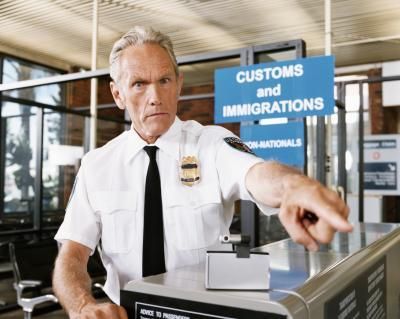
What was supposed to be a family dream holiday to Disney World turned into the holiday from hell after a Mississauga family were detained by border agents at U.S. customs, paraded around in public, and then denied entry and returned home – all for no apparent reason.
Thestar.com reports:
Firas Al-Rawi, an emergency room doctor at Toronto General Hospital, said he booked the Family Day holiday trip in early December so his wife and children could join him at a professional conference in Orlando that week. The family had taken numerous trips to the United States by air and car without incident.
“My kids were so excited, and they were counting down the days for the trip,” said Al-Rawi, 48, an Iraqi who immigrated to Canada with his family in 2006 via Qatar, where he and his wife, Asmaa Ahmed, both worked as physicians. They and their children are all citizens who hold Canadian passports.
The Al-Rawis became part of the 330 or more travellers a day who are refused entry to the United States under the U.S. Immigration and Nationality Act, which gives border officials the right to refuse admission of non-Americans — including Canadian citizens.
According to the National Council of Canadian Muslims, 14 per cent of the 182 human rights complaints it received between 2011 and 2013 involved travel restrictions to the U.S.
On Feb. 13, the family arrived at Pearson International Airport three hours ahead of their 5 p.m. flight. After being fingerprinted and photographed at the check-in counter, Al-Rawi said, they were asked to go for a secondary inspection.
As his family waited in a public area, Al-Rawi said he was questioned about the purpose of his visit, his employment and his family trips in 2014 to Qatar and Dubai.
“We didn’t really mind if it was a random check, given the typical screening with what’s happening with ISIS (the terrorist Islamic State group). We had nothing to hide,” he said. “But we were not prepared for the rest of it. We were stressed, not knowing what was going on.”
After a 10-minute interview, Al-Rawi said he and his family were fingerprinted and photographed again before uniformed officers came to inspect their suitcases.
During the inspection, the family said, their electronics — one iPhone, two MacBooks and three iPads — were confiscated, and they were ordered to provide passwords so officials could unlock the devices.
“We have uncovered photos we took in our private lives in there,” Ahmed, Al-Rawi’s wife, said of the digital family photos on the devices, where she and her daughter, Zainab, appeared without their headscarves.
A customs supervisor later told the family they were being denied entry to the U.S. and asked them to sign papers to declare they were withdrawing their applications for admission, he said. Al-Rawi refused and asked for a reason.
“He said, ‘You are not going to your trip because we have doubts if you are going to return to Canada after the trip,’” said Al-Rawi, who spent more than five years working to earn an Ontario medical licence and restart his stalled practice in Canada.
United States Customs and Border Protection refused to comment on the Al-Rawi incident, but said travellers are responsible for proving their innocence.
On a typical day, the agency said, it processes 992,000 admission applications to the U.S., refuses 366 persons as inadmissible and arrests 22 wanted criminals at the ports of entry.
“Applicants for admission bear the burden of proof to establish that they are clearly eligible to enter the United States. In order to demonstrate that they are admissible, the must overcome all grounds of inadmissibility,” said Jennifer Evanitsky, a spokesperson for the USCBP.
Those grounds, she said, include health, criminality, security, labour certification, illegal entrants, immigration violations and documentation requirements.
Banned travellers, she said, may apply for a temporary waiver, but “the process can be lengthy and there is a cost per application regardless of the decision.”
Al-Rawi said American officials have yet to return the seized electronics and the family is concerned about the implications of this action for future travels; their passports now carry U.S. stamps showing that they withdrew their admission applications to the U.S., which is equivalent to the person being denied entry.
Lawyer Khalid Elgazzar, vice chair of the National Council of Canadian Muslims, said being barred from entry to the U.S. can affect a person’s ability to fulfill work obligations, not to mention the stigma that’s created among colleagues and friends.
“There is a sense that these secondary screenings are not random,” said Elgazzar. “Canadians do not have any rights in the U.S. There is no access to information. There’s no redress mechanism and little you can do.”
The council plans to do a survey investigating the Muslim community’s experience with travel and mobility, as well as a spring forum to address the impact of the post-9/11 period on civil liberties.

SO…..How is this working out at the Mexican Border ?
SO…..How is this working out at the Mexican Border ?